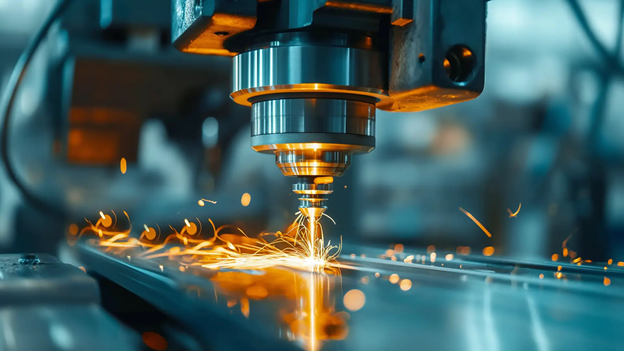CNC (Computer Numerical Control) machining refers to the manufacturing process where a computer controls the tools’ operations during their use. CNC machining is indispensable for manufacturing numerous goods across different industries, and it stands for the accuracy of the industry.CNC machining makes it possible to maintain the required parameters while dealing with numerous types of errors across the industries of automobiles and medical instruments. Accumulating information on the conditions that improve the accuracy of CNC machining is imperative to improve the quality as well as performance of the manufacturing industry.
Defining Precision and Accuracy
Here are the simple definitions of precision and accuracy:
- Precision is how reliably a machine can execute the same task with no deviation. Precision aims to ensure that when you create multiple parts, they are all nearly identical.
- Accuracy is defined as the degree to which a finished part aligns with its intended design or specifications. Accuracy means that the part will flawlessly integrate with the design even if produced in one instance.
The production of high-quality parts and reduce waste in manufacturing are both dependent on the critical combination of precision and accuracy.
Tight Tolerances as Mandatory
CNC machines must create parts that adhere to specific specifications with almost no room for mistakes due to stringent tolerances. These tolerances are vital in manufacturing products that have to fit together just right or perform particular tasks. As in Aerospace engineering, there may be various poor or good differences between the segment parts and even at the minimal level it may cause massive issues. This tight tolerance enables CNC machines to address the issue of quality and reliability by adapting to well-defined part tolerances.
The Impact on Manufacturing
CNC machining, with its focus on precision and accuracy, greatly influences the manufacturing process in several key ways:
Enhancing Product Quality
CNC machining means that each part is machined to fit the desired specification and hence the high quality of the final product. Whenever it is a screw or any part of an engine, CNC machines provide a high standard of dimension and quality, thereby ensuring high quality of the end product.
Enhancing Efficiency and Lowering Costs
Production has smaller amounts of waste due to the high precision and accuracy of CNC machines. A decrease in mistakes leads to fewer faulty parts, therefore reducing the need for reworking and trimming costs. Moreover, CNC machines operate more quickly than typical methods, increasing their efficiency and allowing manufacturers to create a higher number of parts in a shorter time.
Technological Advancements
The versatility of the current CNC machinery is always evolving.. The technology behind CNC machining has advanced to the point where automatic tool changers, software enhancements, and rising automation make it both precise and efficient. Such developments help to correct detailed parts in the manufacturing process, and at the same time, the complexity of the part increases.
Factors Determining Level of Precision and Accuracy of CNC Machines
Several factors can affect how precise and accurate a CNC machine can be:
- Machine Condition: A consistently serviced machine functions more skillfully. Machine components can lose precision due to wear and tear.
- Cutting Tools: Accurate cutting requires the use of sharp, high-end cutting tools. Using dull tools can result in mistakes in the final result.
- Material Properties: Machinable material type can affect precision. Hard materials can often complicate the accuracy of cuts.
- Programming Accuracy: To ensure accuracy and precision in manufacturing, the CNC Machining Parameters should be set correctly while programming.
- Temperature: Heat generated due to metal cutting processes affects the materials and thus has a detrimental effect on the micron accuracy.
- Machine Calibration: The main benefit of calibration is to be completely confident that the machine is optimized and is able to make the tightest tolerances.
The Critical Importance of the Machinist
Although CNC machines are extensively automated, the machinist still serves a crucial function in maintaining precise and accurate results. Here’s why the machinist is crucial:
- Machine Setup: The machinist has to establish the correct setup for the machine to ensure efficient functioning. This includes the positioning of the workpiece and the setting of cutting tools.
- Programming: The machinist is responsible for inputting the CNC Machining Parameters, which directly affect precision.
- Tool Maintenance: A machinist ensures that the cutting tools remain sharp and well looked after to maintain precision.
- Inspection: Once the part is machined, the machinist inspects it 0 to make sure it meets the expected specifications.
- Problem-Solving: When difficulties happen during machining, the machinist has the duty of addressing and solving the issue.
- Continuous Learning: To stay on top of the latest CNC technology, machinists strive to improve their skills, maintaining precise and accurate work.
Handling Challenges and Making Changes
Despite advancements in CNC machine technology, complications can still occur. Machinists routinely have to make changes to either the machine or the machining practices to guarantee that parts fulfill the required specifications. This might require resetting the machine, making changes to the tool paths, or optimizing the CNC Machining Parameters. Maintaining precision and avoiding expensive errors is crucial for machinists who need to develop strong problem-solving skills.
Summing Up
CNC machining is defined by precision and accuracy so that parts are created according to precise specifications. Learning about the factors that shape these qualities and the vital role played by machinists allows manufacturers to continually improve the efficiency and quality of their manufacturing processes. In today’s competitive manufacturing market, monitoring CNC Machining Parameters and maintaining tight tolerances are essential elements of success.



